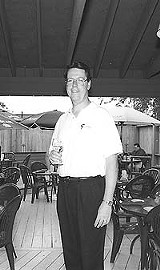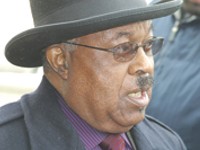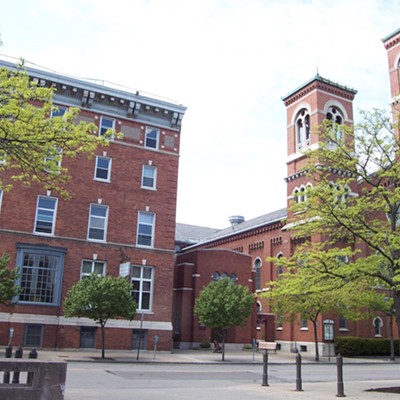News Briefs 6.18.03
[
{
"name": "500x250 Ad",
"insertPoint": "5",
"component": "15667920",
"parentWrapperClass": "",
"requiredCountToDisplay": "1"
}
]
Lawmakers at the June 4 meeting of the Monroe County Legislature's Ways & Means committee went out of their way to be mean to one another. As noted in this week's cover story ("The tobacco trick," page 10), tempers flared between Democrats demanding hard data on the county's finances and Republican legislators, particularly committee chair Jack Driscoll of Henrietta.
But the first fireworks were launched over a tangential subject: the future site of Monroe Community College's Damon City Campus and the Advanced Technology Education Center (ATEC) MCC plans to build somewhere downtown later this decade. Funds for the combined ATEC/Damon center are included in the county's budget for future projects, but the location listed in the budget is Brighton, not Rochester.
As City noted in an editorial that hit the streets the same day ("Develop this!" June 4), Republicans --- specifically, County Executive Jack Doyle --- have raised the possibility of locating ATEC/Damon on the college's Brighton campus, rather than downtown. Top local Dems strongly oppose that idea, as they consider the college's presence a key to revitalizing the city's blighted center.
Representatives of the county administration pointed out, quite reasonably, that Brighton is listed as the location because the project would also include upgrades to buildings on MCC's suburban campus --- regardless of where ATEC/Damon ends up.
Yet the subject prompted one Dem to mention the Sibley Building as a possible location for ATEC/Damon, and the proverbial poop subsequently hit the fan.
Driscoll openly questioned why the county would invest in a building owned by people who "can't pay their taxes."
That prompted Democratic Legislator Chris Wilmot, a part-owner of the Sibley Building, to ask Driscoll "You want a permanent enemy? Because I'm right here."
"I'm just repeating what I read in the paper," Driscoll said. As City reported in a May 14 cover story, "Big debt downtown," Sibley's owners (a partnership formed by the Wilmot family's Wilmorite, Inc. real estate development and management company), owe over $4 million in back taxes, late fees, and related payments.
Wilmot, who had not initially raised the issue, disclosed his financial interest in the property and demanded an apology from Driscoll for engaging in a personal attack. Driscoll said he was unaware that Wilmot was involved with the Wilmorite property, and again stated that he was only repeating what he'd read in the paper. Wilmot grudgingly accepted what he considered "half an apology."
Springtime fields of brown
As the legislative season in Albany winds down, the Rochester Business Alliance is making a last-ditch plea for progress on "brownfields" legislation.
Brownfields are abandoned, more-or-less contaminated industrial and commercial sites, a commonplace of Rust Belt cities. The sites may not be immediately lethal, but they still must be cleaned up before any redevelopment can proceed. Rochester is home to many brownfields, in locations as different as old factory grounds in the city's northwest quadrant and odd pockets of the lower Genesee River gorge.
"The lack of state action on brownfields hurts local governments when these properties are not redeveloped," said RBA head Thomas Mooney recently in a prepared statement. "It is the leading factor contributing to urban sprawl." RBA is working on this issue in coalition with groups statewide, including the Buffalo Niagara Partnership and the New York Bankers Association.
The coalition, deploring the fact that "New York is the only industrial state in the Northeast or Midwest that does not have a statutorily defined brownfields clean-up program," is pushing for a compromise. Right now, various state Assemblymembers, Senators, Governor George Pataki, and lobby groups are standing behind one or more competing brownfields bills. As with the state Superfund program for toxic site clean-up, debate revolves around how stringent the clean-up standards will be, and how the public and private sector will share the clean-up costs.
Trouble is, the debate has gone on so long that advocates on all sides are just wishing something will happen.
Take Val Washington, a native Rochesterian who heads the Albany based group Environmental Advocates. The key right now, says Washington, is "getting a brownfields bill where everybody knows the process." With such a bill in place, she says, everyone will at least know the rules, and that in itself may open the door to progress.
Washington agrees with Mooney and RBA about the role of brownfields in creating sprawl. But in her view, things are especially bad within city limits. She notes, for example, that brownfields take up around 40 percent of the land in Buffalo.
Rochester's not quite in Buffalo's league in that respect, Washington says. But Schenectady, she says, has around 300 brownfield sites, averaging one-quarter acre. This configuration, which is not unknown in Rochester, make comprehensive clean-up that much harder --- and appropriate legislation that much more necessary.
The other Toronto linkages
On June 10, the Province of Ontario's highest court okayed gay marriage by rewriting an official definition of marriage to read: "the voluntary union for life of two persons to the exclusion of all others" [emphasis added]. The same day, longtime partners Michael Stark and Michael Leshner were married in a Toronto courtroom. According to the Toronto Star, the court said that "denying gays and lesbians the ability to marry offends their dignity, discriminates on the basis of sexual orientation, and violates their equality rights under the [Canadian] Charter of Rights and Freedoms."
The court also ordered that marriage certificates be issued to two other same-sex couples whose marriages took place in Toronto in 2001 but had not been legally recognized. So Stark and Leshner don't technically qualify for first-place honors. But Canada surely deserves kudos for becoming the third nation, after the Netherlands and Belgium, to recognize gay marriage.
Not that there aren't countercurrents. Days after the ruling, 250 social conservatives protested outside the Toronto courthouse, according to a Star report. "You cannot invade the hallowed sanctity of marriage... which is between one man and one woman," one religious leader said. "They should stop reading the Bible and start reading the Charter of Rights," Leshner responded. (Meanwhile, the US, gripped by superstition and political reaction, inches backward --- with rare exceptions, like Vermont's civil-union law or Rochester's extension of spousal benefits to partners of gays and lesbians who work for the city.)
The Gay Alliance of the Genesee Valley reacted quickly to the good news from the north. Said director Chuck Bowen in a prepared statement: "One of the couples [in Toronto] said that 'today is the death of homophobia in the courtroom as we've known it.' Unfortunately it's in Canada and not here... We're close to Toronto, and with the new ferry coming, with a two-hour commute, that will make it tempting for same-sex couples to move to Canada... I hope New York will take this under consideration."
We couldn't help notice a tiny difference between news coverage on each end of the planned ferry route. When breaking the story, the Democrat and Chronicle ran with an AP shot of Stark and Leshner right after the ceremony; the couple posed shoulder to shoulder, holding wine glasses and chastely toasting their future. The Star, though, ran a shot of the men just millimeters from lip-lock. Can the political distance between two longtime national partners be measured by photo selection?
Tax-cutters strike again
Last week the US House of Representatives, under the ineffable sway of Tom DeLay (R-Texas), passed an $82 billion tax cut bill that was to be a repair-job extending the newly-increased child tax credit to the working poor. The vote was 224-201, with 10 not voting.
The increased child credit accounted for only $3.5 billion of the bill, however. As news reports put it, the remainder of the $82 billion went to "middle and higher income families." That is, in the view of critics, more goodies for those who need them less or least, under the guise of "economic stimulus."
How did our local House delegation stack up? Democrat Louise Slaughter voted against the bill. Republican Tom Reynolds, the bill's sponsor, cast an enthusiastic yes. The LA Times quoted him: "This bill will achieve even greater parity and fairness in the tax code." The other local Republicans, Amo Houghton and Jim Walsh, also voted yes.
Seeking blessed community
Led by California-based Rabbi Michael Lerner, the Tikkun Community held a four day "teach-in on Middle East peace" early this month in Washington, DC. Like several other new peace-and-justice groups grounded in the American Jewish tradition, Tikkun offers a rational yet spiritual program to oppose organizational and state terror, end the massive human-rights violations against a people under occupation, and dispel the hopelessness that attends an inadequate "road map" (already widely known as the cul-de-sac).
Longtime peace activist Jim Berger, a native Brightonian who lives in Wayne County, was one Upstater who attended the conference. The centerpiece of the event, he says, was a "Resolution for Middle East Peace" that the Tikkun Community wrote for presentation to members of Congress.
Among other things, the resolution calls for the "return of Israel to its pre-1967 borders, with minor border modifications mutually agreed upon," "a politically viable Palestinian state in all of the pre-1967 West Bank and Gaza including East Jerusalem," "an international Truth and Reconciliation Commission" modeled on the one in post-apartheid South Africa, and "an international fund to provide reparations for Palestinians and to resettle Palestinian refugees in the new Palestinian state, and to provide reparations for Israelis who fled from persecution in Arab lands, and to resettle Israeli settlers within the pre-1967 borders of Israel."
Underlying this political agenda is the Tikkun philosophy, grounded in expansive spirituality, ecology, and non-violence. (For the nuances, see "Tikkun: repairing worlds, transforming spirits, making waves," City Newspaper, March 13-19, 2002; or visit www.tikkun.org.)
Berger says he and others spent one day visiting Congressional offices to drop off materials and make personal contact. Senators Schumer and Clinton, he says, didn't appear in person, but their staffers listened to the message. A few members of Congress did respond more directly and favorably, though. Chief among them, says Berger, was Representative Dennis Kucinich (D-Ohio), who gave a lengthy interview to Tikkun magazine last year. Kucinich, says Berger, "got us in the door [and] spoke a couple of times to us."
The conferees, says Berger, also heard talks by leading public intellectuals and activists like Harvard's Cornel West, author Jonathan Schell, and Global Exchange director Medea Benjamin.
Next comes the home front. Berger says some local people who've formed a Tikkun group will meet Sunday, June 22, 5:30 p.m., in a Corn Hill home. For details, contact Berger at 244-2415 or by e-mail: [email protected].
Flag this vote
On June 3, the US House of Representatives voted 300-125 (with eight not voting) in favor of a bill "proposing an amendment to the Constitution... authorizing the Congress to prohibit the physical desecration of the [US] flag."
Known popularly as the "flag-burning" law, the measure could result in a weakened First Amendment. Symbolic speech could be criminalized and restricted in a strange and frightening way.
So how did the local delegation line up? Along party as well as ideological lines. Representatives Amo Houghton, Tom Reynolds, and Jim Walsh, all Republicans, voted yes. Rep. Louise Slaughter, a Democrat, voted no.
Speaking of...
-
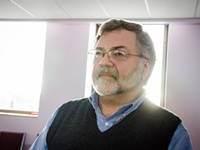
Why winning the Fight for $15 is essential
Dec 29, 2015 -
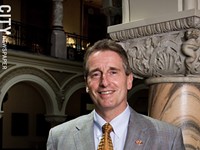
Bob Duffy dishes
Jan 7, 2015 -
![[UPDATED] Cooperative Extension plans a move](https://media1.roccitymag.com/rochester/imager/maggie-brooks/u/review/2450842/brooksmaggie8_thumb.jpg)
[UPDATED] Cooperative Extension plans a move
Oct 17, 2014 - More »
